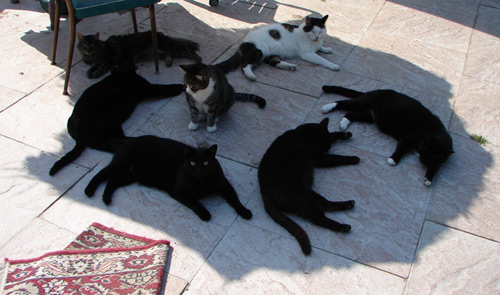(The internet runs on cats)
Today the New York Times has an interesting article on "The Rise of the New Groupthink," which is the emphasis on teamwork over the individual. The author is interested in how introverts operate in environments dominated by groupthink like brainstorming sessions and open offices. Anecdotally, some of the most successful inventors are introverts, so it's important to keep them happy and productive. And empirically,
Decades of research show that individuals almost always perform better than groups in both quality and quantity, and group performance gets worse as group size increases. The “evidence from science suggests that business people must be insane to use brainstorming groups,” wrote the organizational psychologist Adrian Furnham. “If you have talented and motivated people, they should be encouraged to work alone when creativity or efficiency is the highest priority.” (source)From personal experience, I have mixed feelings about groups. From my years working in environmental advocacy, I gained inspiration and a feeling of solidarity with my cohorts. But nearly every class project I'm part of, I feel that I'm held back by my teammates. Even if I end up doing less work, I somehow rationalize that it's because I couldn't go the direction I wanted to, or that my ideas clashed too much with others in the group. Two endeavors that I'm really excited about right now are the graduate group I'm part of, GISER, and a graduate student conference I'm helping organize. These groups work well because the leadership committees are experienced at organizing, and good at utilize everyone's unique skills without putting too much responsibility on one person. I could write an entire blog post on this, but three things that are crucial to effective leadership groups are transparency, delegation, and accountability.
I also think about my future as a scholar, and the importance of collaboration. Within my graduate program we have a good mix of group projects and individual nurturing, but my dissertation project will largely independent. My job working with MSU Extension for the past two summers was also a good mix of teamwork and independence. I tend to generate and refine ideas better during conversation (I think this means I'm an extrovert), but I carry them out better on my own. And while interdisciplinary collaboration may just be a buzzword to some,
Recent studies suggest that influential academic work is increasingly conducted by teams rather than by individuals. (Although teams whose members collaborate remotely, from separate universities, appear to be the most influential of all.) The problems we face in science, economics and many other fields are more complex than ever before, and we’ll need to stand on one another’s shoulders if we can possibly hope to solve them. (source)In our world of post-normal science and wicked problems, teamwork is key.

Funny that just last weekend the Times had a piece making almost the opposite argument:
ReplyDelete"A few people were extremely hesitant to join the project and later left, thinking that the whole enterprise was insane. But a majority bought in. We eventually pulled together a core group of 12 talented scientists, which over time grew to 25 members. It was a proud moment, frankly, just to have the courage as a team to move forward.
"From the first, it was clear that we would have to change the culture of how scientists work. Watson was destined to be a hybrid system. It required experts in diverse disciplines: computational linguistics, natural language processing, machine learning, information retrieval and game theory, to name a few.
"Likewise, the scientists would have to reject an ego-driven perspective and embrace the distributed intelligence that the project demanded. Some were still looking for that silver bullet that they might find all by themselves. But that represented the antithesis of how we would ultimately succeed. We learned to depend on a philosophy that embraced multiple tracks, each contributing relatively small increments to the success of the project.
"Technical philosophy was important, but so were personal dynamics. Early on, I made the unpopular decision to bring the entire team together in a war room, to maximize communication. The shared space encouraged people with wildly different skills and opinions to exchange ideas."
[http://www.nytimes.com/2012/01/08/jobs/building-the-watson-team-of-scientists.html]
Interesting! I think the author of this article is still holding onto the "lone genius" myth. After all, as I quoted Michael Crow and Dan Sarewitz last week, "Steve Jobs didn't just invent the computer in his garage." The author ignores the enormous groupwork that goes into making sociotechnical infrastructure and taking radical innovations to the mainstream audience.
ReplyDeleteI just read the NY Times article too. The biggest thing I disagree with Cain on is her stark contrast between "group work yes" and "group work no". The distinction is really not that simple. She is missing out on all kinds of research which deals with way more nuanced ideas of what makes groups successful (like personality type, the underlying rules, or the kind of task at hand). I see where she is coming from as far as certain kinds of tasks should be done in quiet solitude, but there are also an amazing array of tasks that are way more fun to do in person, in a group.
ReplyDeleteThere is plenty of evidence to show that facilitated group interaction consistently surpasses individual capacity in the area of concept exploration and creativity for “open ended” (wicked) problems. We have experianced this in 15 years of using general morphological analysis in differenet settings. See e.g.:
ReplyDelete“Wicked Problems – Social Messes: Decision support Modelling with Morphological Analysis”. Springer, 2011.
You can see a description at Springer here:
http://www.springer.com/business+%26+management/technology+management/book/978-3-642-19652-2
Regards,
Tom R.
Swedish Morphological Society
Thanks for the great comments, Shannon and Tom!
ReplyDelete